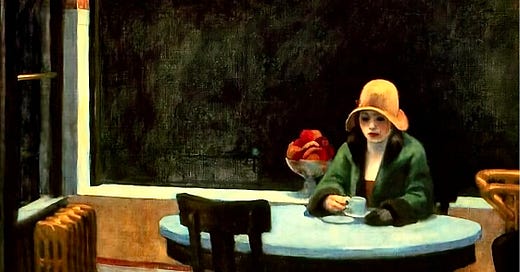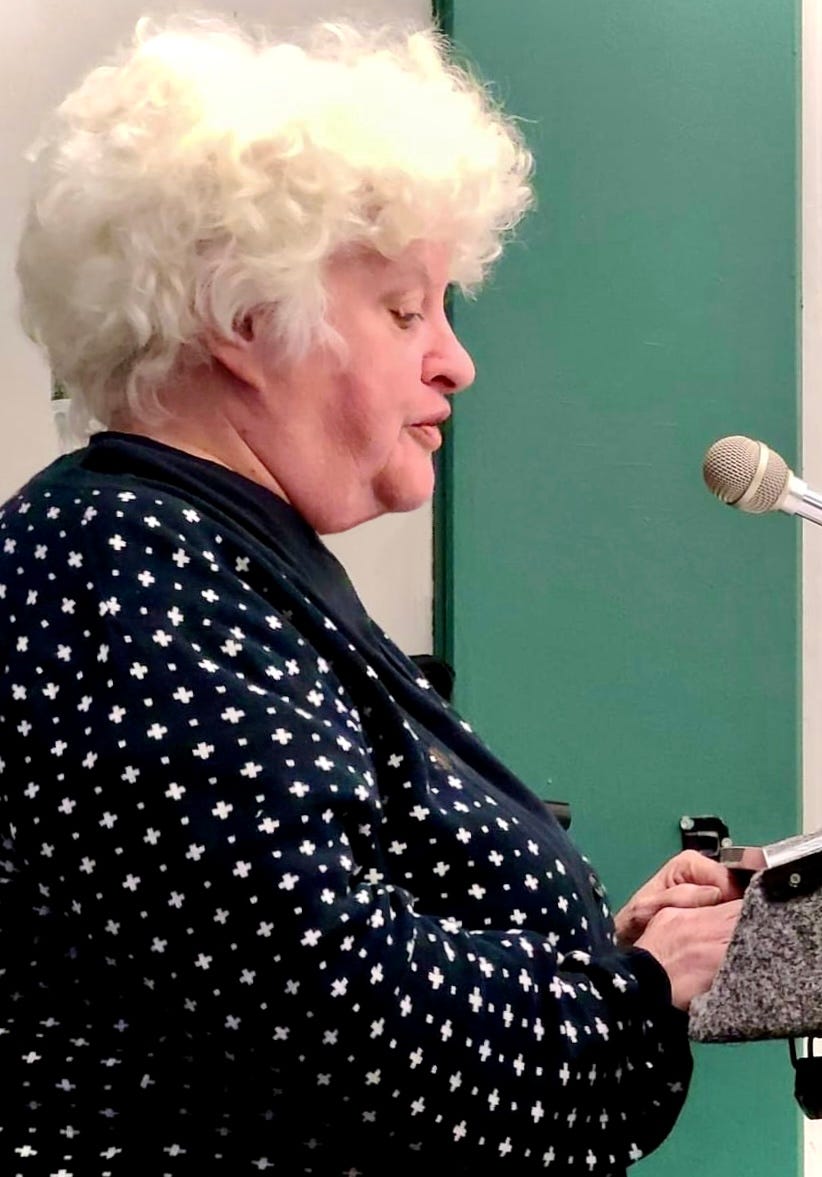ONE FOR THE LADIES OF THE CHORUS
Urban loneliness & disconnect — Ekphrastic short fiction by Lois Anne DeLong
‘The Automat’ (Oil on canvas, 1927) by Edward Hopper (1882–1967)
ONE FOR THE LADIES OF THE CHORUS
By Lois Anne DeLong
‘We're in the money.
The skies are sunny.
Old man Depression, you are through.
You've done us wrong’
— Al Dubin and Harry Warren, 1933
A nickel and two pennies. That was all a complete search of purse, jacket pockets, and couch cushions had yielded. A nickel and two pennies. Heaving a sigh, Helen touched each well-worn coin. It was just enough for subway fare one way and a cup of tea. No room for mistakes. No margin for error. Yet, if all worked out as she had planned, the payoff could be life-changing.
Checking the clock on the mantle, she saw she had a half-hour to get ready. Helen had timed out the whole day, and this block of minutes was set aside for bathing and dressing. She had picked out a simple, modest navy blue dress to wear, and over that would be draping the sun-faded coat that had taken her through the last two winters. Last night, she had carefully mended the hanging hem on the coat, and if one did not look too close, it would pass muster. To show a bit of color, she also clipped an old dime store broach to her felt hat. The image in the mirror was exactly what she sought to project—a somewhat dowdy woman entering her thirties.
But, what to do about her face? Looking in the mirror, she appeared as washed out as an over-exposed piece of film, and there was no way to fix that. Like everything else she owned, her make-up supplies had dwindled and her lipstick had just about given up the ghost. She had considered palming one a few days ago at Woolworth’s, but thought better of it when noticing the steely gaze of the security guard. She had enough problems in her life without adding a criminal record to the mix.
Maybe no lipstick will work in my favor, Helen thought a little while later, as she settled into a booth in a surprisingly empty coffee shop. Sitting with her back to the window, she slowly sipped the cup of tea she had budgeted for earlier that day. As she savored the now lukewarm liquid, she tried to build up her faltering courage. Maybe my unpolished lips will make them think I’m serious and proper, she thought to herself. Of course, since the crash in ‘29, everyone looked serious. People rarely laughed anymore, except on the silver screen, and nobody danced unless they were paid to do so. The Depression, as they called it, truly was as boring and sad as its name implied.
Helen looked at the clock above the counter. Ten more minutes before her appointment at the school across the street. She was right on schedule. Five more minutes here, and two minutes to cross the street to the school. That timing would put her in the secretary’s office with exactly three minutes to spare. Just to check that her time allocation was correct, Helen took the newspaper listing out of her tiny clutch and re-read it for the fifth time. It called for ‘a well-read, modest young woman to assist the night school principal with administrative tasks’. Helen rarely read more than the ads on the subway, and since coming to New York to dance in the Follies, few would call her modest.
Yet, no one would call her stupid. Since leaving the rural environs outside of Peekskill in the early days of the Depression, she quickly learned how to improvise. She improvised her way onto speakeasy chorus lines downtown for five years. Now, bolstered by a handful of quotes memorized from a half-dozen books in the New York Public Library, Helen was ready to adapt once more, to give up the notion she would ever dance in the Follies and find a steady paycheck. Though this job did not offer a large salary, it did offer security and respectability. And her improvisations would no longer need to include coping with the wandering hands of drunks.
As she buttoned up her coat to leave, Helen nodded to the waitress who came to remove the cup and saucer. She began to apologize for the lack of a tip when the waitress pulled a tube of lipstick and a small compact from the pocket of her apron. “Maybe just a touch up, after the tea?” she suggested. Helen shyly rolled a small amount on her lips, then thanked the waitress for her kindness. “Just keep smiling, girl,” the waitress responded, “and give them a good show.” With a bit of a shrug, she added, “Takes one to know one, right?” Helen nodded in affirmation, and whispered her thanks. It meant the world to her to have another refugee from the chorus line applauding from the wings.
About a half-hour later, Helen stopped before the coffee shop window and executed a perfect curtain call bow. The waitress blew back a kiss. “Make us proud,” she whispered, and watched as Helen disappeared into the night.
Lois Anne DeLong is a freelance writer living in Queens, New York, and is active in the Woodside Writers literary forum. Her stories and poems have appeared in Dear Booze Cocktales, Short Beasts, Bright Flash Literary Review, DarkWinter Literary Journal, Literary Cocktail, and The Bluebird Word. In her free time, DeLong enjoys going to the theatre, singing show tunes in piano bars, and cheering her beloved NY Mets.
Submit to THE WOODSIDE REVIEW:
woodsidewrites@protonmail.com









